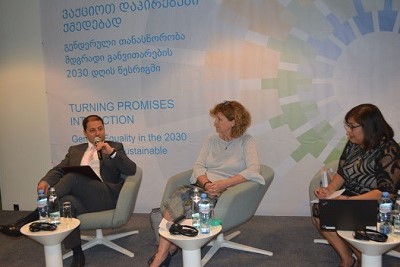UN Women launches its flagship global report on gender equality in the Sustainable Development agenda in Georgia
Date:
On 30 May, UN Women launched the global UN Women flagship report Turning promises into action: Gender equality in the 2030 Agenda for Sustainable Development in Georgia. The report spotlights inequalities and challenges faced by women; identifies gaps and opportunities for gender equality in the 2030 Agenda for Sustainable Development.

UN Women launched the report in partnership with the National Statistics Office (GEOSTAT) to underline the importance of national gender statistics for tracking progress made on behalf of women and girls. UN Women and GEOSTAT presented the audience, which included partners from the government, civil society, the development community and academia, with a gender analysis of the 17 Sustainable Development Goals (SDGs) and respective recommendations offered by the report.
Jessamyn Encarnacion from UN Women Research and Data Section presented the report and underlined that 4.4 million more women than men worldwide are living in extreme poverty (less than $1.90 a day). She emphasized that different dimensions of well-being and deprivation are deeply intertwined in the lives of women and girls. For example, a girl who is born into a poor household and forced into early marriage is more likely to drop out of school, give birth at an early age, suffer complications during childbirth and experience violence – all of which are also SDG targets.
“Of particular relevance for Georgia is the emphasis of the global report to look beyond national averages to uncover the significant gaps between women and girls who, in the same country, are living in worlds apart because of their income status, ethnicity or where they live,” said Erika Kvapilova, UN Women Country Representative, in her opening remarks.
“In the process of nationalizing the SDG targets and indicators, we have completed or embarked on a number of studies. The National Study on Violence against Women, conducted with EU and UN Women support in 2017, provides baselines for a number of SDG indicators and a clear picture of the prevalence of violence and public attitudes towards it. More importantly, it allows us to measure over time the effectiveness of state policies and development interventions in this field,” said Gogita Todradze, the Executive Director of GEOSTAT.